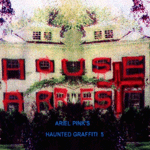|
|
 |
Dusted Reviews
Artist: Ariel Pink's Haunted Graffiti Album: House Arrest Label: Paw Tracks Review date: Feb. 9, 2006 |

|
|
|
 |
If Ariel Pink’s music sounds like 70s pop radio, as most music writers will tell you, he must have lived through a funny 1970s - one where everything sounded distinctly uneasy. Critics use historicising metaphors to explain the ghostliness of Pink’s eldritch songs, reading them as invocations of tropes past, a spell cast upon the murky machinations of the 8-track recorder. Alternately, people stew over Pink’s outsider status, questioning his ‘authenticity’; sometimes they accuse him of outsider-pop formalism.
The outsider argument is the flimsiest in circulation; history/hauntology is more fascinating. At his Woebot website, Matthew Ingram suggests Pink’s music “duplicate[s] the frighteningly unheimlich qualities of that surrounding Bobby Beausoleil and Charles Manson’s music.” (Maybe the outsider gambit isn’t so far gone: after all, Pink consciously invokes ‘long lost weekend’ singer Skip Spence in “West Coast Calamities.”) Here Ingram accurately uncovers the uncanny resonances of Pink’s music and its ability to trigger repressed memories and experiences in the receptive listener. The wet blanket that Pink wraps around his music, borne of the ‘limitations’ of autodidactic song writing and technology, coats his songs with a membrane of uneasy mystery that suggests something secret being brought to light. Sometimes Pink’s songs break cover, becoming completely emotionally eviscerating, such as the aquatic sob of “Oceans of Weep,” where pianos drop petals of churchy melody over a happy-sad abyss.
Ariel Pink’s music feels nostalgic because of its ability to resurface lost material from your subconscious, soundtracking the subsequent emotional estrangement. Even at its most pop and ‘joyous,’ like the opening “Hardcore Pops Are Fun,” there’s a subtext of loss, the song’s joy scrawled over with discomfort. I recently wrote that Pink’s songs were so affecting because they sounded ‘worn in,’ but he just as often sounds ‘worn down’ by everyday life’s complexities.
By Jon Dale
|







